![]()
![]()

Eugene Peterson (1932) author of "The Message", a contemporary paraphrase of the
Holy Bible from the original languages, "crafted to present its tone, rhythm, events, and
ideas in everyday language." It was written in order to recreate the spirit of the original
books of the New Testament, which were written in the street language of the day

Thomas C. Oden (1931) is an American Christian theologian associated with Drew University in New
Jersey. An ordained United Methodist Elder, he is also perhaps the "Father of the Paleo-Orthodox
movement" and arguably one of the most influential churchmen of the late 20th and early 21st centuries. He
has proven to be very important in the contemporary ecumenical movement and in Christian evangelical circles
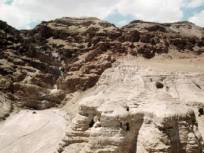
Muhammed edh-Dhib (1931) was the young shepherd from the Ta'amireh
clans residing in Bethlehem, who discovered the Dead Sea Scrolls in 1947
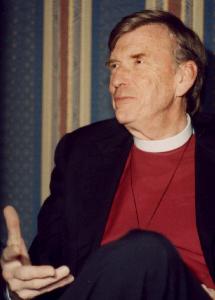
John Shelby Spong (1931)
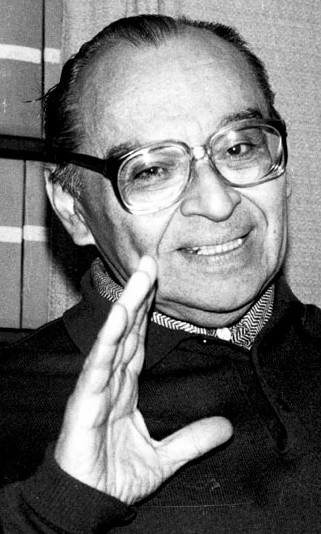
Gustavo Gutiérrez (1928) is one of the founders of liberation theology
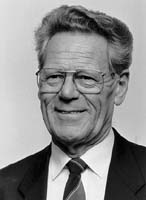
Hans Küng (1928) is an eminent Swiss theologian, and a prolific author. Since 1995 he has been President
of the Foundation for a Global Ethic (Stiftung Weltethos). Küng is a Roman Catholic, but the Vatican has
rescinded his authority to teach Catholic theology. In the late 1960s Küng became the first major Roman
Catholic theologian after the late 19th century Old Catholic Church schism to reject the doctrine of papal
infallibility, in particular in his book Infallible? An Inquiry
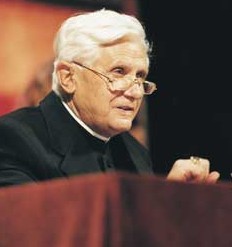
Pope Benedict XVI (1927)
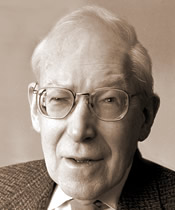
J. I. Packer (1926) is a Christian theologian in the Calvinist/Reformed tradition. He currently serves
as the Board of Governors' Professor of Theology at Regent College in Vancouver, British Columbia.
He is considered to be one of the most important evangelical theologians of the late 20th century.
Packer also served as general editor of the English Standard Version of the Bible
John B. Cobb (1925) is an American United Methodist theologian who played a crucial role in
the development of process theology. He integrated Alfred North Whitehead's metaphysics into
Christianity, and applied it to issues of social justice
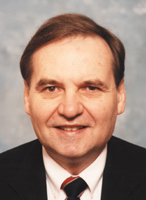
Norman Geisler (19??)

Karol Wojtyła (1920-2005) reigned as pope of the Roman Catholic Church and
sovereign of Vatican City and of the Holy See for almost 27 years. In 1992 he
announced that the Catholic Church erred in condemning Galileo's work that proved
the work of Copernicus was valid, that the planets circle the Sun and not the Earth
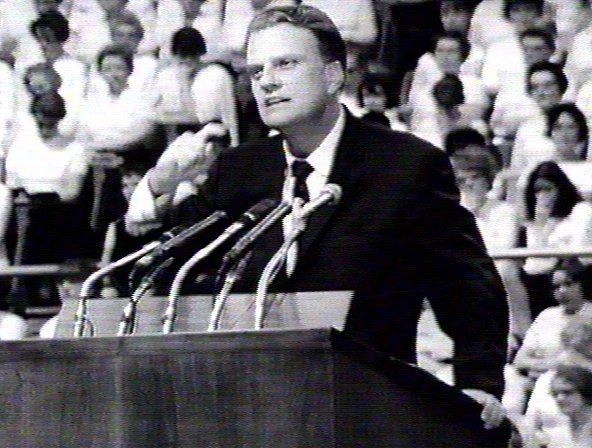
Billy Graham (1918) is an American Christian evangelist who has preached the message of
Christianity around the world, reaching live audiences of 210 million people in 185 countries. He has
led hundreds of thousands of people to make personal decisions to accept Jesus Christ into their lives,
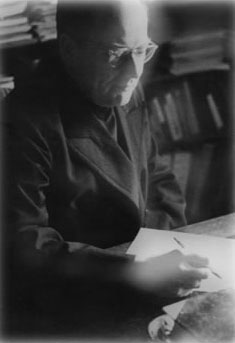
Bernard Lonergan (1904-1984) author of Insight: A Study of Human Understanding (1957) and
Method in Theology (1973), which established what he called Generalized Empirical Method
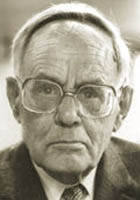
Karl Rahner (1904-1984) was one of the most influential Roman Catholic theologians of the 20th century.
He was born in Freiburg, Germany, and died in Innsbruck, Austria. His theology influenced the Second
Vatican Council and is ground-breaking for a modern understanding of Catholic faith. Written near the end
of his life, Rahner's Foundations of Christian Faith (Grundkurs des Glaubens), is the most developed and
systematic of his work, which was for the most of his life done in theological essays
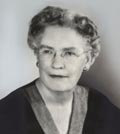
Georgia Harkness (1891-1974) was a Christian theologian in the Methodist tradition. Harkness has been
described as the first significant American female theologian and was important in the movement to gain
ordination for women in American Methodism. She was a leading figure in the modern ecumenical movement
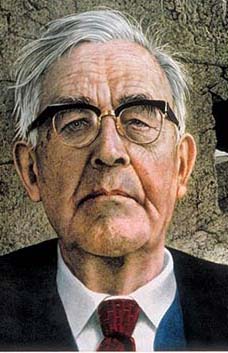
Karl Barth (1886-1968) was one of the leading thinkers in the neo-orthodox movement

Rudolf Karl Bultmann (1884-1976) his "History of the Synoptic Tradition" is still highly regarded as
an essential tool for gospel research, even by scholars who reject his analyses of the conventional
rhetorical tropes or narrative units of which the Gospels are assembled, and the historically-oriented
principles called "form criticism," of which Bultmann has been the most influential exponent
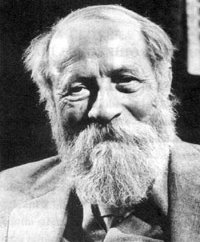
Martin Buber (1878-1965) author of "I and Thou"
.jpg)
Albert Schweitzer (1875-1965) As a young theologian his first major work,
by which he gained a great reputation, was The Quest of the Historical Jesus
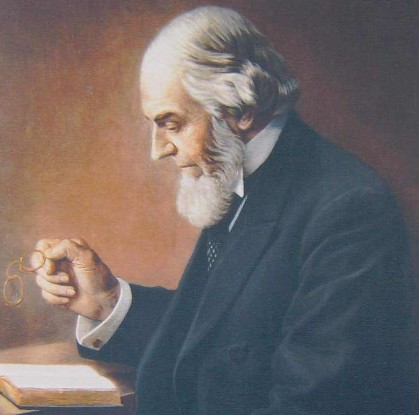
Charles Taze Russell (1852-1916) founded one of the first Bible Societies in the United
States, Zion's Watch Tower Tract Society in 1881, the People's Pulpit Association of New
York in 1909, and the International Bible Students Association of London in 1914
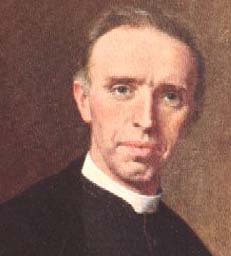
Desire Joseph Mercier (1851-1926) under the auspices of Pope Leo XIII,
he organized an institute for the study of the teachings of St. Thomas Aquinas
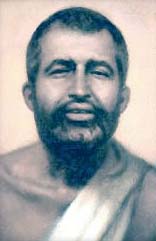
Ramakrishna (1836-1886) teacher of Advaita Vedanta Hinduism.
He preached that all religions lead to the same goal
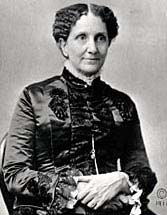
Mary Baker Eddy (1821-1910) founded the Christian Science Church
Baha'u'llah (1817-1892) founder of the Bahá'í faith
which holds that all religions should be united
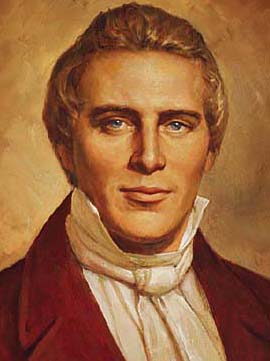
Joseph Smith (1805-1844) founder of the Latter Day Saint
movement, which developed into Mormonism
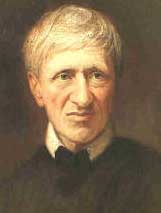
John Henry Newman (1801-1890) author of "the Grammar of Assent"
Christian Hermann Weisse (1801-1866) was a German Protestant religious philosopher. He developed (along with Fichte)
a new speculative theism and was the first theologian to propose the two-source hypothesis (1838), which is still held by
a majority of biblical scholars today. In the two-source hypothesis, the Gospel of Mark was the first gospel to be written
and was one of two sources to the Gospel of Matthew and the Gospel of Luke, the other source being the Q document, a lost
collection of Jesus's sayings
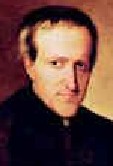
Antonio Rosmini Serbati (1797-1855) founded the the Institute of the Brethren of Charity,
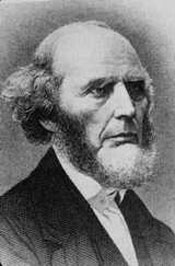
Charles Grandison Finney (1792-1875) was a major leader
of the Second Great Awakening in America
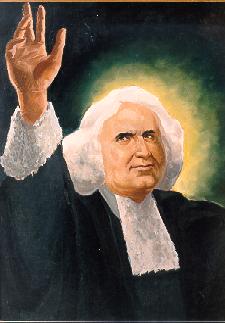
George Whitefield (1774-1770) was one of the leaders of the Methodist movement,
is most famous for his preaching in the Great Awakening movement of Christian revivals
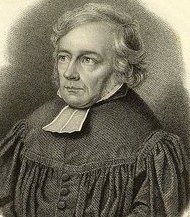
Friedrich Schleiermacher (1768-1834) Reden über die Religion, Monologe

Adam Clarke (1762-1832) is chiefly remembered for writing a commentary on the Bible which
took him forty years to compile and which was a primary Methodist theological resource for two centuries
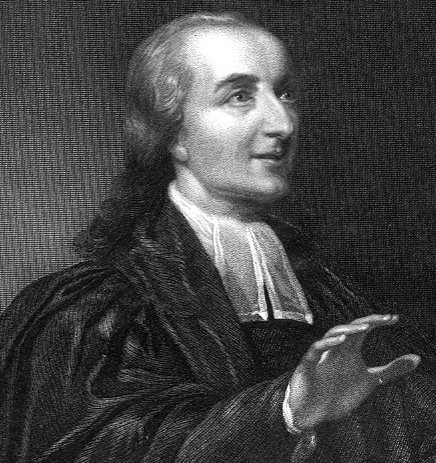
John Fletcher (1729-1785) was one of Methodism's first great theologians
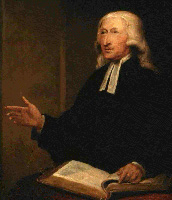
John Wesley (1703-1791) was the founder of the Methodist denomination of Protestant Christianity
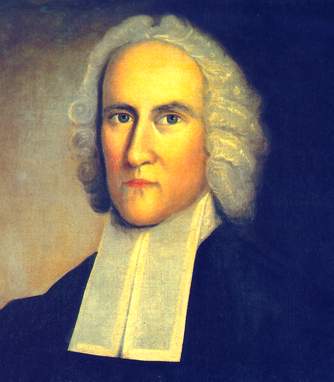
Jonathan Edwards (1703-1758) is known as one of the
greatest and most profound American evangelical theologians
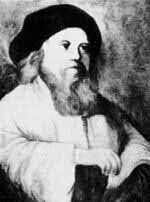
Rabbi Israel ben Eliezer (1698-1760) was the founder
of the spiritual movement known as Hasidic Judaism
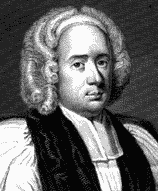
Joseph Butler (1692-1752) refuted psychological hedonism,
contributed to deontological ethics,
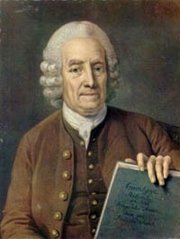
Emanuel Swedenborg (1688-1772)
Samuel Clarke (1675-1729)
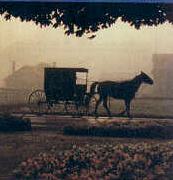
Jacob Amman (1656-1730) gave the Amish movement its name
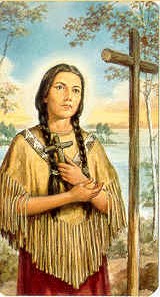
Kateri Tekakwitha (1656-1680) is honored by the Catholic Church as the patroness of ecology
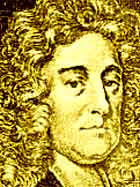
Thomas Burnet (1635-1715) theologian and writer on cosmogony
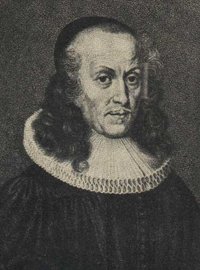
Philipp Jakob Spener (1635-1705) published two chief works, Pia desideria and Allgemeine
Gottesgelehrtheit, and began that form of pastoral work which resulted in the movement called Pietism
Miguel de Molinos (1628-1697)
John Bunyan (1628-1688)
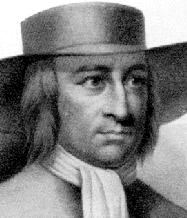
George Fox (1624-1691) was an English Dissenter and the founder of
the Religious Society of Friends, commonly known as the Quakers
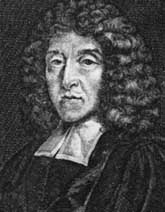
Francis Turretin (1623-1687) was a defender of the Calvinistic
orthodoxy represented by the Synod of Dort
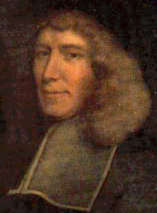
John Owen (1616-1683) was an English Nonconformist church leader. In 1647 he again attacked the
Arminians in The Death of Death in the Death of Christ, which drew him into long debate with Richard Baxter

Richard Baxter (1615-1691) was an English Puritan church leader
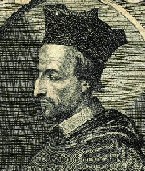
Cornelis Jansen (1585-1638)
Bishop James Usher (1581-1656) calculated from dates given in the old testament
that the earth was created on the evening preceding October 23, 4004 bc in his work
Annales veteris testamenti, a prima mundi origine deducti
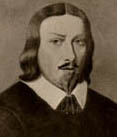
Jakob Boehme (1575-1624) was a Christian mystic
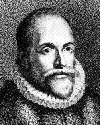
James Arminius (1560-1609) is best known as the founder of the anti-Calvinistic school in
Protestant theology, and thereby lent his name to the antithetical theology to Calvinism - Arminianism
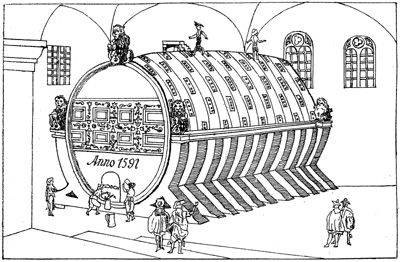
Anton Praetorius (1560-1613) was a protestant pastor and fighter against the persecution of witches
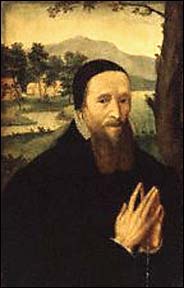
Richard Hooker (1554-1600) is the co-founder
(with Thomas Cranmer) of Anglican theological thought
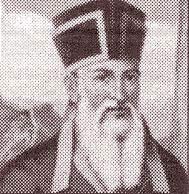
Matteo Ricci (1552-1610)
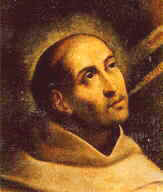
St John of the Cross (1542-1591) renowned for his cooperation with
Saint Theresa of Avila in the reformation of the Carmelite order
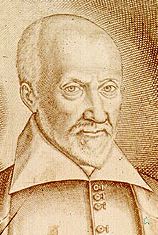
Pierre Charron (1541-1603)
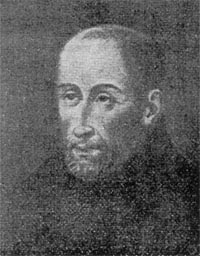
Luis de Molina (1535-1600) jesuit theologican, he developed the doctrine of
middle knowledge (i.e. God's knowledge of conditional future contingent events)
Isaac Luria (1534-1572)
Francisco Toletus (1532-1596) became the first jesuit cardinal,
Domingo Banez (1528-1604) theologian and philosopher, coauthor of a
theological system based on the doctrine of St. Thomas Aquinas called Banezianism
Bartolomeo Medina (1527-1580) dominican theologian,
Theodore Beza (1519-1605) participant in the Protestant Reformation,
succeeded Calvin in the great institution of learning at Geneva which he had founded
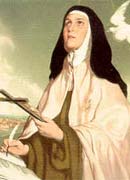
Saint Teresa of Avila (1515-1582) was a Spanish Roman Catholic mystic and monastic reformer
John Knox (1513-1572) was a Scottish religious reformer who played the
lead part in reforming the Church in Scotland in a Presbyterian manner

John Calvin (1509-1564) was a prominent Christian theologian during the Protestant
Reformation and is the namesake of the system of Christian theology called Calvinism
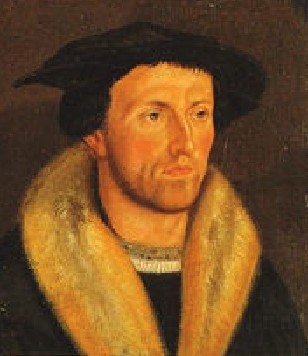
Heinrich Bullinger (1504-1575) Swiss religious reformer
Obbe Philips (1500-1568) was one of the early founders of Dutch
Anabaptism. Menno Simons was ordained by him around 1537
Alexander Alesius (1500-1565)

Felix Manz (1498-1527)
Conrad Grebel (1498-1526)
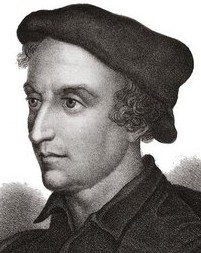
Philip Melanchthon (1497-1560) was an associate of
Martin Luther and writer of the Protestant Reformation
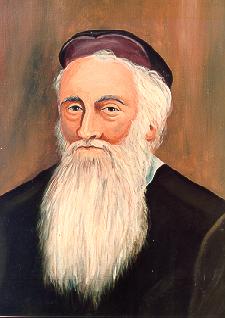
Menno Simons (1496-1561) was an Anabaptist religious leader from the province of
Fryslân (today Netherlands and Germany). His followers became known as Mennonites
Domingo de Soto (1494-1560) domonican theologian,
adopted positions of Aquinas and Duns Scotus,
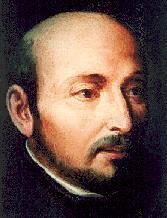
Ignatius of Loyola (1491-1556) was the principal founder and first Superior General of the
Society of Jesus, a religious order of the Roman Catholic Church professing direct service to the Pope
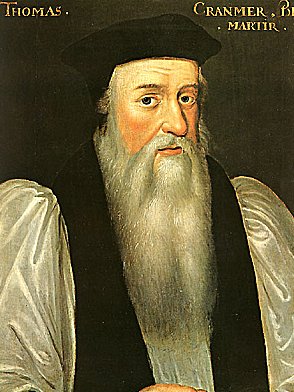
Thomas Cranmer (1489-1556) introduced the Book of Common Prayer, a modernized version of which
is still used today, and in general, led the Church of England in a more Protestant direction
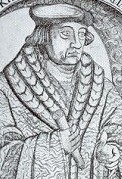
Johannes Eck (1486-1543) was a defender of Catholicism during the Protestant Reformation.
It was Eck who argued that the beliefs of Martin Luther and John Huss were similar
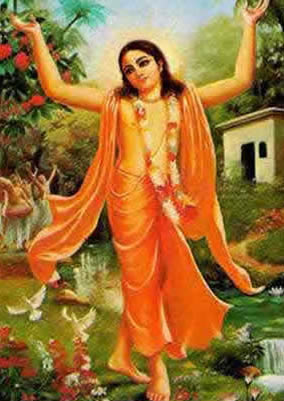
Gauranga (1486-1533) incarnation of Lord Krishna
Johannes Bugenhagen (1485-1558)

Ulrich Zwingli (1484-1531) was the leader of the Swiss Reformation
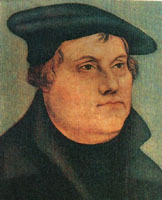
Martin Luther (1483-1546) augustinian monk whose teachings inspired the Protestant
Reformation. He proclaimed justification by faith alone and the priesthood of all believers
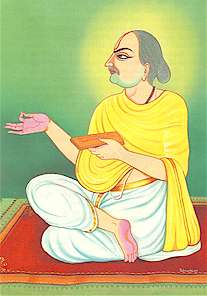
Vallabha (1479-1531)
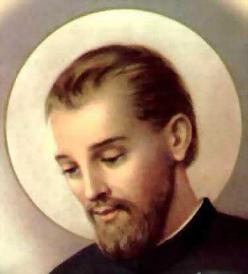
Thomas Cajetan (1469-1534) as entrusted the task of examining and testing the teachings of Luther
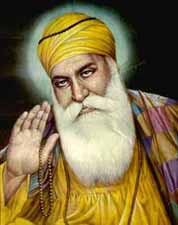
Guru Nanak (1469-1538) founder of the Sikh religion,
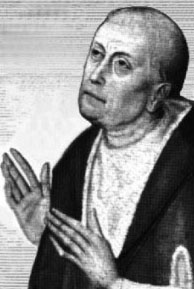
Nicholas of Cusa (1401-1464) was noted for his deeply mystical
writings about Christianity, particularly the nature of the Trinity
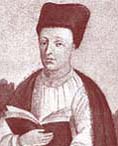
Thomas ŕ Kempis (1380-1471) was a medieval Christian monk and author of
Imitation of Christ, one of the most well-known Christian books on devotion
Jan Hus (1369-1415) initiated a religious movement based on the
ideas of John Wyclif. His followers became known as Hussites
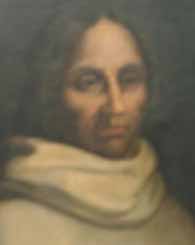
Jean de Gerson (1363-1429) invented conciliarism,
the view that the church is a political society
Pierre d'Ailly (1350-1420) ockhamist, his theology
anticipated fideism, his ethics protestantism
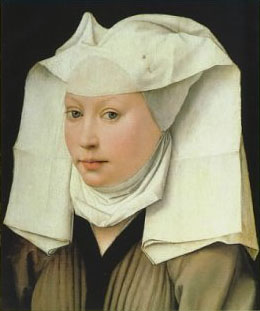
Julian of Norwich (1342-1416) her major work "Sixteen Revelations of Divine Love"
is believed to be the first book written by a woman in the English language
Geert Groote (1340-1384) founder of the Brethren of the Common Life
William of Alnwick (1333) franciscan theologican,
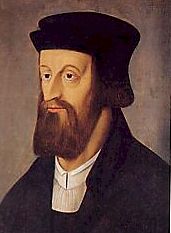
John Wyclif (1330-1384) theologian,
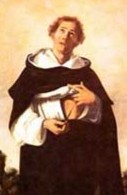
Heinrich Seuse (1295-1366)
Nicholas of Autrecourt (1295-1369) theologian,
Adam de Wodeham (1295-1358) franciscan theologian,
wrote
the prologue to Ockham's Summa logicae,
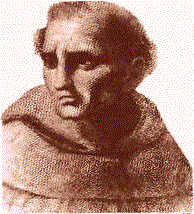
Scotus Johannes Duns (1265-1308) was a theologian and philosopher. Some may argue that during his
tenure at Oxford, the notion of what differentiates theology from philosophy and science began in earnest.
Perhaps the most influential point of Duns Scotus' theology was his defense of the Immaculate Conception of Mary
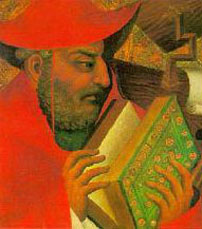
Meister Eckhart (1260-1328) was one of the most influential Christian Neoplatonists
Peter John Olivi (1247-1298) theologian,
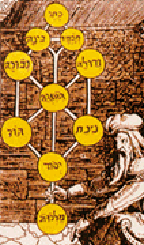
Moses de Leon (1240-1305) Jewish Kabbalist and author of the Sefer
ha-Zohar (Book of Splendour), the most important work of Jewish mysticism

Raymond Lull (1232-1316) christian mystic,
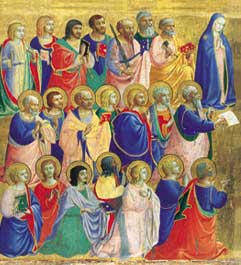
Jacobus de Voragine (1230-1298) author of the Golden Legend, one of the most popular religious works
of the middle ages, a collection of the legendary lives of the greater saints of the medieval church
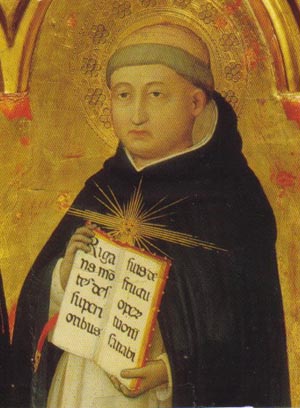
Thomas Aquinas (1224-1274) gave birth to the Thomistic school of philosophy, which was long
the primary philosophical approach of the Roman Catholic Church. He is considered by the
Catholic church to be its greatest theologian and one of the thirty-three Doctors of the Church
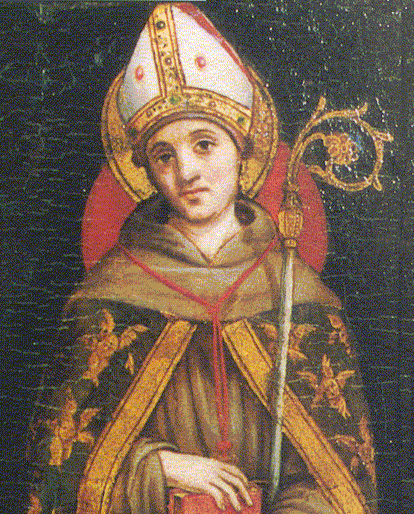
Saint Bonaventure (1221-1271) beheld the winged seraph that had also
appeared to Francis of Assisi, he also outlines a seven-stage spiritual journey,

Robert Kilwardby (1215-1279) archbishop of Canterbury,
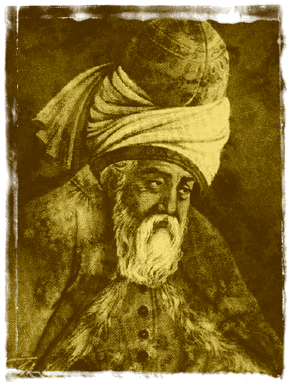
Jalal al-Din Muhammad Rumi (1207-1273)
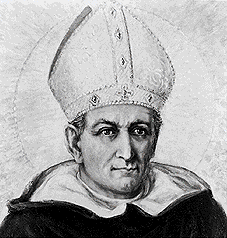
Albertus Magnus (1200-1280) was a Dominican friar who became famous for his universal knowledge and advocacy
for the peaceful coexistence of science and religion. He is considered to be the greatest German philosopher and theologian
of the Middle Ages. He was the first medieval scholar to apply Aristotle's philosophy to Christian thought at the time
Beatrice of Nazareth (1200-1268) had a vision
of the Holy Trinity, wrote Seven Modes of Sacred Love
Nahmanides (1194-1270)
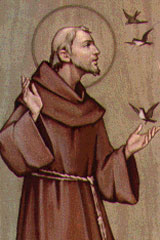
Saint Francis of Assisi (1181-1226) founder of the franciscan order of friars
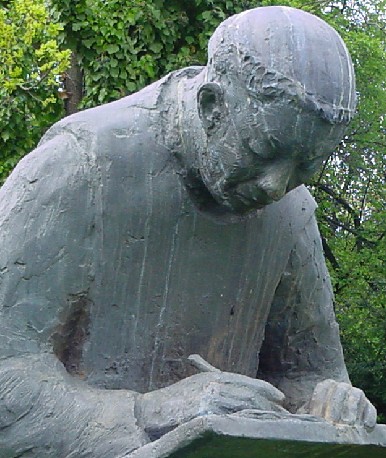
Cäsarius von Heisterbach (1180-1240) Cistercian monk, author of the Dialogue on Miracles
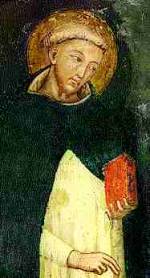
Dominic de Guzman (1170-1221)
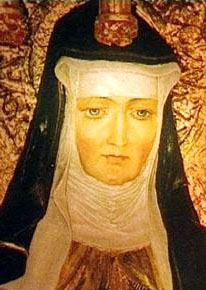
Hildegard von Bingen (1098-1191) German
monastic leader, mystic, author, and composer of music
Richard of St. Victor (d. 1173)
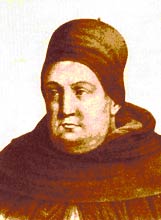
Peter Lombard (1095-1160)

Bernard of Clairvaux (1090-1153) was the primary builder of the reforming Cistercian monastic order,
taught that in mystical union one's will and God's will come into complete conformity,
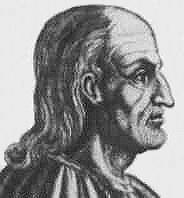
Saint Anselm (1033-1109) held the office of Archbishop of Canterbury, is called the founder
of Scholasticism, but is most famous as the inventor of the ontological argument for the existence of God
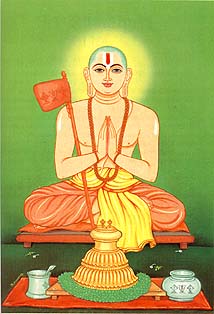
Ramanuja (1017-1137) founded the Visistadvita tradition, which
provides the theoretical basis for Bhakti devotional Hinduism,
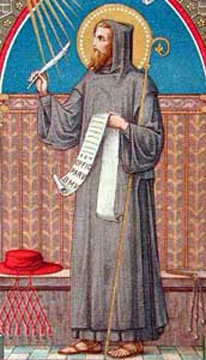
Pietro Damiani (1007-1072)
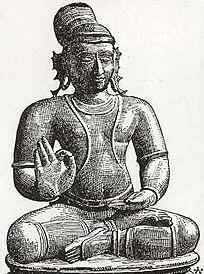
Nammalvar (880-930)
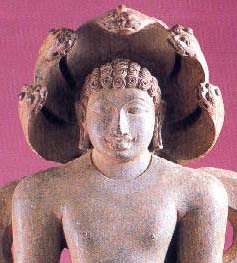
Parsvanatha (872-772) incarnation of Indra
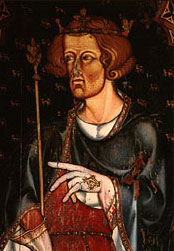
Johannes Scotus Eriugena (810-877) taught that evil is strictly (and simply) nothing (the absence of something),
was a theologian and philosopher. Some may argue that during his tenure at Oxford, the notion
of what differentiates theology from philosophy and science began in earnest. He was one of the most
important Franciscan theologians and was the founder of Scotism, a special form of Scholasticism. Perhaps
the most influential point of Duns Scotus' theology was his defense of the Immaculate Conception of Mary
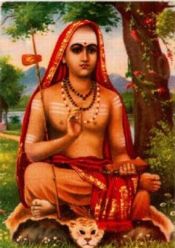
Shankara (788-820) founded Advaita Vedanta Hinduism,
Theodulf of Orléans (760-821) was bishop of Orleans, and became
the foremostcouncilor to Charlemagne on theological matters after the death of Alcuin
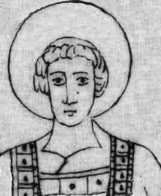
Alcuin of York (735-804) monk from England who became
Charlemagne's leading advisor on ecclesiastical and educational affairs
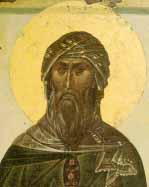
John of Damascus (675-750) theologian,
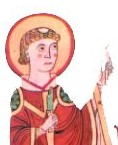
the Venerable Bede (673-735) was a biblical scholar,
and historian ("Historia Ecclesiastica Gentis Anglorum")
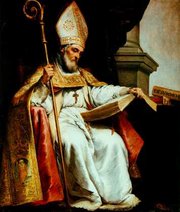
Isidore of Seville (560-636)
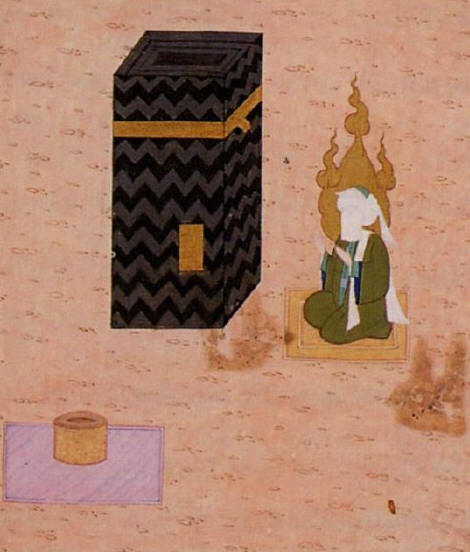
Mohammed (570-632) La ilaha illa Allah, Mohammed rasul Allah
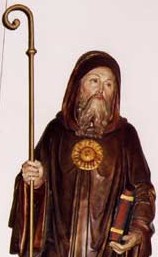
Saint Columbanus (543-615) founded several monasteries in the Frankish kingdoms,
most notably Luxeuil in 590, spreading among the Franks a Celtic monastic rule
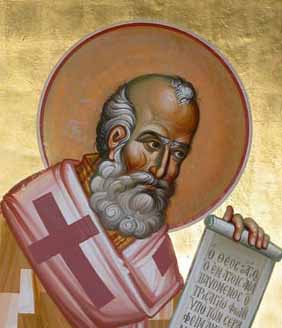
Saint Gregory I (540-604) pope, summarized christian theology,
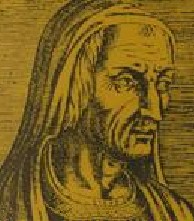
Gregory of Tours (539-594) author of the
Historia Francorum and of books on miracles
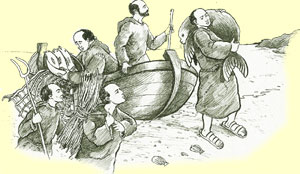
Saint Columba (521-597) was an Irish missionary monk who helped
re-introduce Christianity to Scotland and the north of England
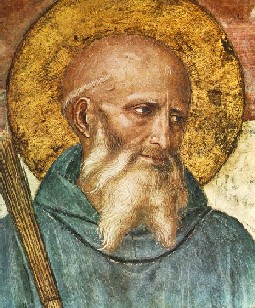
Saint Benedict of Nursia (480-547)
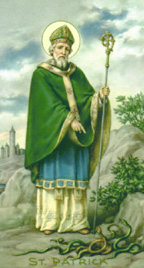
Saint Patrick (4??-493)
Peter the Iberian (411-491)
Nemesius of Emesa (fl. 400) his work "De natura hominis" can
be said to be the first christian-philosophical anthropology

Saint Augustine (354-430) is the pre-eminent Doctor of the Church according to Roman
Catholicism, he held that introspection leads to discovering the created hierarchies by which
to ascend to God, time serves as the narrative structure for the creation's return to God,

Jerome (347-420) is best known as the translator of the Bible from Greek and Hebrew into Latin.
Jerome's edition, the Vulgate, is still the official biblical text of the Roman Catholic Church

Saint Ambrose (340-397) theologican, neoplatonist,
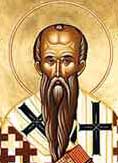
Gregory of Nyssa (330-395) tried to reconcile Platonism with Christianity,
he was known with his brother Basil the Great and Basil's best friend
Gregory of Nazianzus as the Cappadocian Fathers
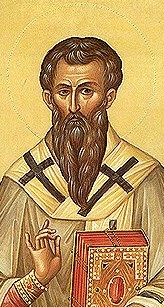
Saint Basil (329-379) bishop of Caesarea, Moralia and Regulae
Martin of Tours (316-397)
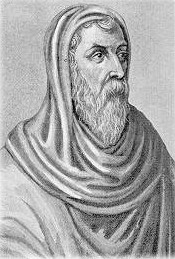
Athanasius (296-373) roman catholics have declared him one of the 33 doctors of the church
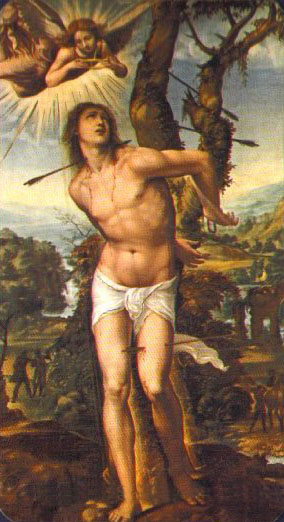
Saint Sebastian (288) christian martyr

Eusebius of Caesarea (275-339)
Anthony the Great (251-356)
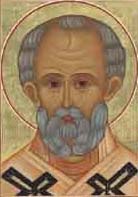
Saint Nicholas of Myra (245-326) national saint
of Russia and Greece, gave alms anonymously

Mani (216-277)
Saint Laurence (210-258) one of the seven deacons of Rome, where he was martyred

Origen (184-254) his writings are important as the first serious intellectual attempt to describe Christianity,
applied the Platonist doctrine of apokatastasis (Greek for "restoration to the original condition") to Christianity

Tertullian (155-240)
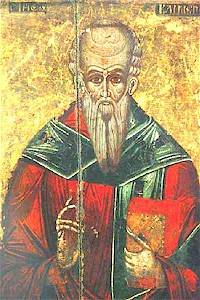
Clement of Alexandria (150 -215) became the colleague of Pantaenus, the head of the
catechetical school of Alexandria, and finally succeeded him in the direction of the school
Montanus (150-210) founder of Montanism, announced a final
age of prophecy,
gained a convert in Tertullian,
Athenagoras (133-190) Christian apologist, author of "Embassy for
the Christians" and a "Treatise on the Resurrection"
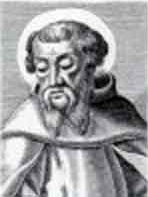
Irenaeus (120-203) the Catholic Church considers him a Father of the Church. He
was a disciple of Polycarp, who himself was a disciple of John the Evangelist
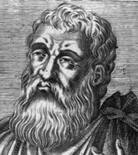
Justin Martyr (110-165) was an early Christian apologist
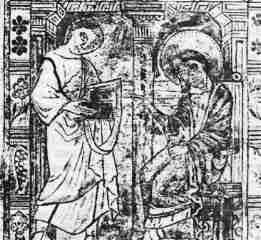
Marcion (110-160) advocated an ascetic Christianity with parallels in gnosticism, Marcion's teaching, known
as Marcionism, was that Jesus revealed to the world a hitherto unknown god, who was different from the God of
the Hebrew Bible. According to Marcion, the god of the Hebrew Bible was inconstant, jealous, wrathful, and legalistic
Valentinius (100-160) gnostic
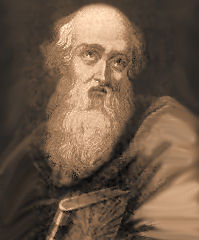
Polycarp (70-160) Polycarp was a companion of Papias another "hearer of John". Polycarp's
famous
pupil was Irenaeus, for whom the memory of Polycarp was a link to the apostolic past
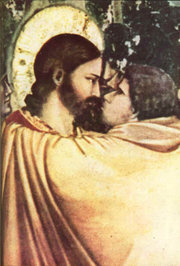
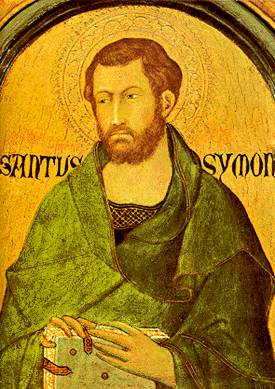

Saint Thomas ()
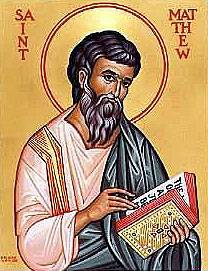
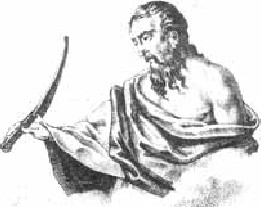
Saint Nathanael () identified with Bartholomew, According to scripture, Bartholomew was one of the disciples to whom
Jesus appeared at the Sea of Tiberias after the resurrection (John 21:2). He also witnessed the ascension. Tradition has it
that after the ascension, Bartholomew went on a missionary tour to India, where he left behind a copy of the Gospel of Matthew
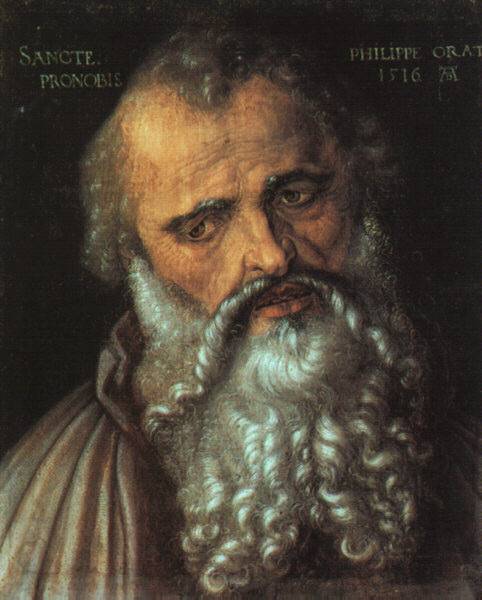
Saint Philip from Bathesda () The Gospel of John states (1:43) that he was called by Jesus to be
his follower;
that he introduced Nathanael (sometimes identified with Bartholomew) to Jesus
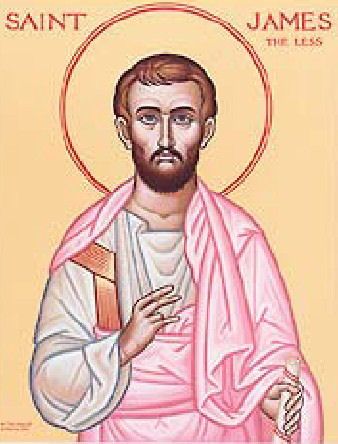
Saint James the Less (-62)
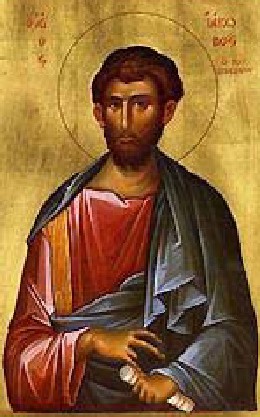
Saint James the Great (-42) brother of John

John the Apostle () as first a disciple of John the Baptist, and later one of the twelve
disciples of Jesus, St. John the Apostle, is the disciple "whom Jesus loved"
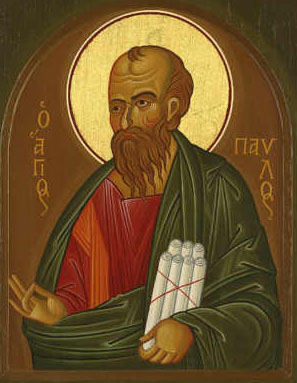
Paul (3-67) made the first great efforts through his epistles to gentile communities to show that
the God
of Abraham is for all people, rather than for Jews only, was not an apostle

Saint Simon called Peter (5bc-67ad) first pope of the Christian church
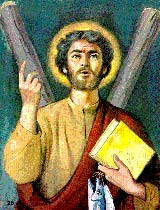
Saint Andrew (-60) Peter's brother, a Bathesda fisherman, disciple of John the Baptist, was the first to follow Jesus,
Eusebius quotes Origen as saying Andrew preached in Asia Minor and in Scythia, along the Black Sea as far as
the Volga. Hence he became a patron saint of Romania and Russia
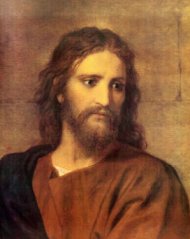
Jesus Christ (6bc-32ad) added "love thy neighbor like yourself"
as the eleventh commandment
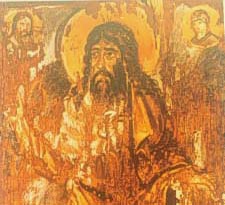
Saint John the Baptist (6bc-30ad) baptized Jesus of Nazareth
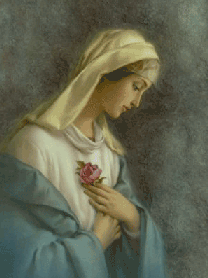

Philo of Alexandria (20bc-50ad)
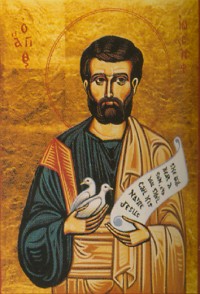
Joseph ()

Mahavira (599-527 bc) founder of Janism
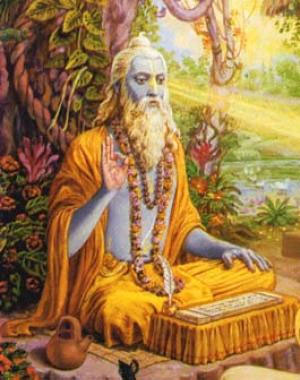
Vyasa (600-500 bc) author of the Bhagavad Gita
which is part of the Mahabharata,

Ezekiel (622-570 bc) performed a resurrection
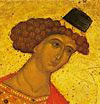
Daniel (623-538 bc) interpreted dreams and
was delivered from the lion's den
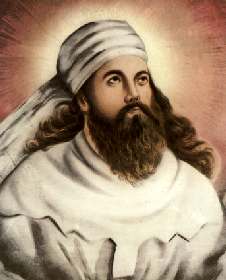
Spitama Zarathustra (628-551
bc) Zoroastrianism wasthe national religion
of ancient Iran
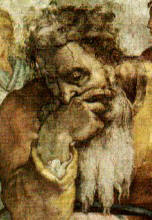
Jeremiah (650
bc) is considered by modern scholars to have writtenor redacted much of the Old Testament as we have it today
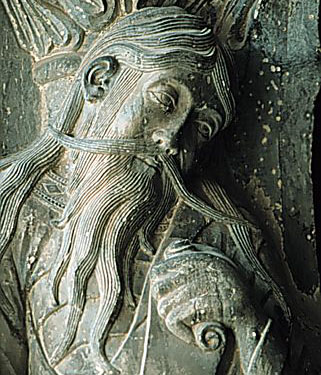
Isaiah (740-681
bc) prophet of the new heaven and earth
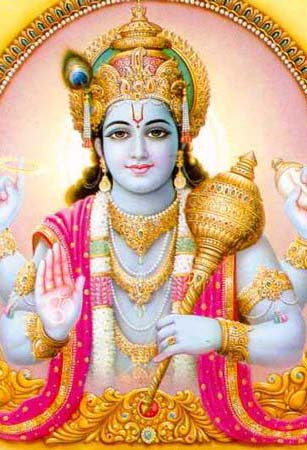
Krishna (900 bc) all attractive supreme personality of godhead

Elijah (900
bc) herald of the messiah, his mission wasto restore exclusive loyalty to God
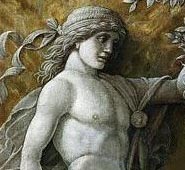
David (1085-965
bc) defeated Goliath,
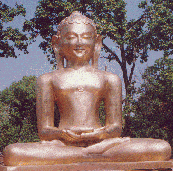
Lord Rishabha (1??? bc) is considered the first Tirthankar of Jainism
Moses (1526-1406
bc) received the tencommandments
on Mount Sinai from God
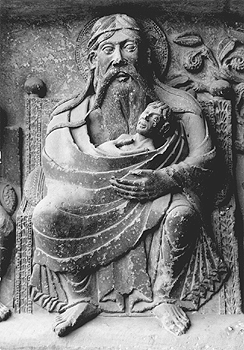
Abraham (1991-1816
bc) migrated with the Canaans to Egypt,
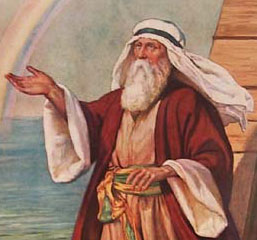
Noah (2944-1994 bc) built the ark,
Enoch (3284-3017 bc) son of Jared, grandson of Mahalalel, great grandson of Kenan, great great
grandson of Enosh, great great great grandson of Seth and great great great great grandson of Adam